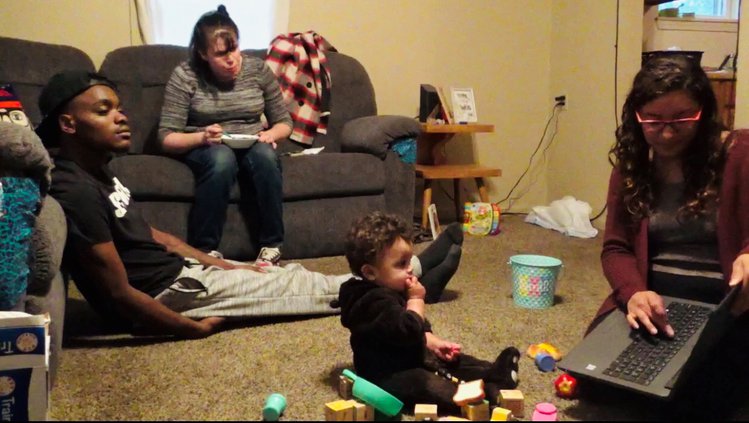EDITOR’S NOTE: This is the first story in a two-part series about the ABC program at Sunflower Early Education Center.
Parenting is never easy but it is especially difficult for families facing adversity.
That is the premise behind a program that is new to Sunflower Early Education Center (EEC). It is designed to strengthen relationships between parent and child, said Alejandra Velez, parent coach for the Attachment & Biobehavioral Catch-up (ABC) program.
Velez also serves as EEC family service coordinator and English/Spanish translator; she earned a bachelor’s degree in social work.
Like all other EEC services, the program is free to families.
“Candidates for ABC are families who face poverty and other issues that interfere with parent-child relationships,” Velez explained. “In these situations, parents aren’t focused on the child as much as they want to be and should be.
“They are living in survival mode. This means parents are not interacting well with their child,” Velez continued. “As a parent coach, I suggest ways they can better relate to their baby or toddler.”
In addition, parents learn to put up boundaries when necessary to ensure the child’s safety and well-being.
The ABC Infant Model focuses on children between 6 and 24 months of age. The program entails 10 one-hour sessions in the family’s home.
Velez, who received specialized ABC training, is monitored by two supervisors; videos are taken during each of the sessions.
The first family to complete the program received a montage of video clips that illustrate the family’s progress during ABC sessions. (The family is featured in part two of this series.)
“Early in the process, I conduct an assessment to determine what parents are struggling with,” Velez said. “For example, when a child plays, do the parents participate? Do they take over or do they follow the child’s lead?
“And how do parents react if a child starts crying or gets mad? When children are 1 or 2 years old, they don’t know how to deal with these emotions on their own. I can suggest ways parents can help children regulate emotions so the situation doesn’t spin out of control.”
Velez might suggest holding the child in a calming and comforting manner. “This tells the child that parents ‘will be with me when I’m sad, mad or hurt.’ This reassures the child.”
University of Delaware researchers developed ABC and tested it in many early-childhood environments. Studies show ABC produces substantial and lasting improvements, Velez commented.
The United Methodist Health Ministry Fund provided a grant that financed training for Velez.
Heather Quillin, EEC children’s service coordinator, said “we are very grateful to the health ministry fund and Delaware mentors for supporting us through the year-long mentorship.
“These mentors ensure Alejandra is implementing the program with fidelity and providing the best service possible to the children and families we serve,” Quillin said. “So much of what we do in early intervention depends on parents or caregivers being present, involved and responsive to their child.
“For many parents, this may not come naturally. Therefore, we help them identify their child’s attempts to communicate and teach them how to appropriately respond to nurture their child and build attachment.”
Quillin noted that Velez “is a natural fit as an ABC parent coach. So much of what Alejandra does is focused on developing and fostering relationships with families. This new ABC program brings another facet to what we can offer families.
“As providers of early intervention, we recognize how critical bonding and attachment are to a family. This greatly impacts all areas of development for a child.”
Sunflower Diversified Services operates the EEC. The non-profit agency serves infants, toddlers and adults with intellectual disabilities and delays in Barton, Pawnee, Rice, Rush and Stafford counties. It is in its 53rd year.





